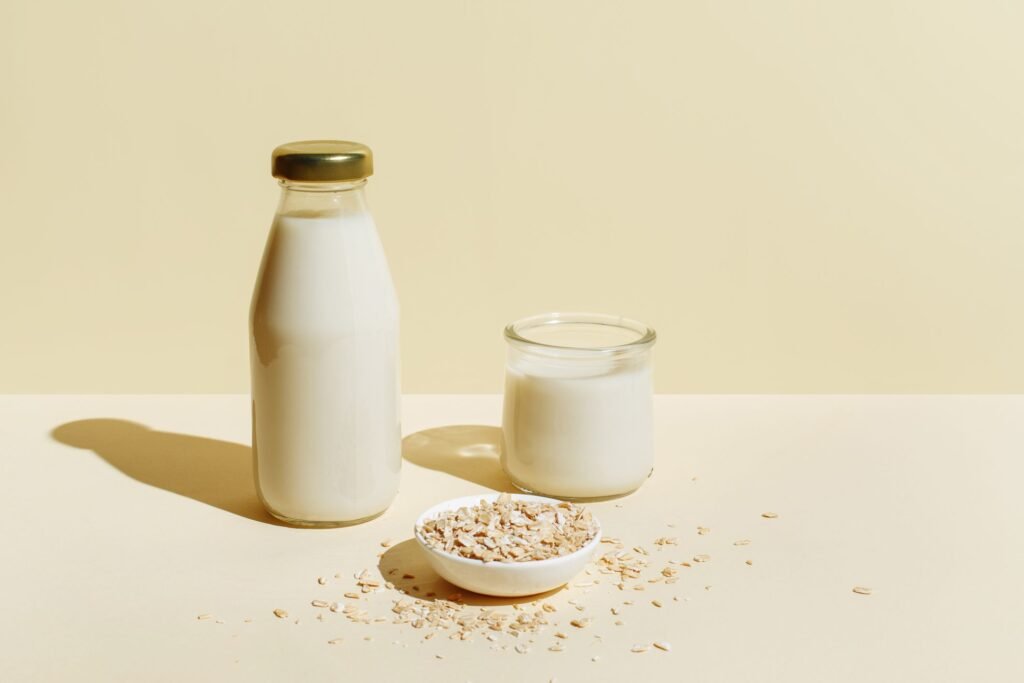Oat milk is one of the most popular plant-based milk alternatives. It is made by blending oats with water and other ingredients to create a mildly sweet and creamy drink.
Oat milk is naturally lactose-free, vegan-friendly, and delicious in lattes, cappuccinos, smoothies, and more. However, it has come under scrutiny due to concerns about its potential to spike blood sugar levels.
So, does oat milk actually cause a significant rise in blood sugar? Here, we break down everything you need to know about oat milk, including what’s in it, how it impacts blood sugar, and how it compares to other plant-based milks.
Oat milk is made by blending oats and water until the mixture is creamy and smooth. However, many commercially-produced oat milk products often contain additional ingredients to improve their texture, sweetness, and nutritional profile.
To create a smoother, creamier product, many commercial oat milk products are made with amylase enzymes, which break down the starch in oats into simpler sugars, like maltose. Simple sugars, like maltose, are easier for your body to absorb than complex sugars, like starches.
Oat milk can also contain emulsifiers, like lecithin, which are additives that help mix two things that don’t normally blend well, like oil and water, and prevent the mixture from separating over time. Oils like canola and sunflower oil are also added to some oat milk products to keep them from separating and to improve texture and consistency. Additionally, many oat milks contain added sugars and flavorings to enhance taste.
Oat milk can also be fortified with vitamins and minerals like B12, vitamin D, and potassium to boost its nutritional value. Plain oat milk is not a good source of these nutrients.
Oat milk has a moderately high glycemic index (GI) of 59.6.
“This means that oat milk can cause a moderate rise in blood sugar, depending on the amount consumed,” Kimberley Rose-Francis, RDN, CDCES, LD, told Health.
However, this completely depends on how oat milk is consumed. “Depending on what you have with this beverage could change how your blood sugar responds,” Amanda Sauceda, MS, RD, creator of The Mindful Gut, told Health. “If you were to have oat milk as part of a sweet drink, think something you get at Starbucks, then it’s very likely that your blood sugar will spike,” she said.
Oat milk alone is generally high in carbs and low in nutrients that slow the absorption of sugar into your bloodstream, like protein and fiber. A cup of unsweetened oat milk contains 14 grams of carbs, but only 1.9 grams of fiber and 4 grams of protein.
However, studies show that pairing high-carb items, like oat milk, with a source of protein can significantly reduce their impact on blood sugar. For example, if you’re drinking an oat milk latte alongside a breakfast of eggs and avocado, you’ll have a slower and steadier rise in blood sugar than if you were to drink the oat milk latte alone.
For most people, the glycemic impact of unsweetened oat milk isn’t a major concern, especially if oat milk is consumed as part of a healthy diet.
However, its high carb content may be an issue for individuals with high blood sugar, insulin resistance, or those following low-carb diets.
Oat milk contains 14 grams of carbs per cup, while coconut, almond, and soy milk contain just 7, 3.4, and 3.2 grams per cup, respectively.
If you’re trying to cut back on carbs, you may want to opt for a lower-carb plant-based milk, like almond milk, instead of oat milk, especially if you’re using it as an everyday milk. Additionally, oat milk isn’t a good option for people following low-carb diets, such as keto diets.
Keep in mind that oat milk products that contain added sugar are higher in carbs than unsweetened products. Sweetened oat milks can contain more than double the amount of carbs found in unsweetened oat milk.
While you don’t have to completely avoid oat milk, it’s best to opt for unsweetened varieties whenever possible, since many commercial brands add extra sugar to their products. Choosing unsweetened oat milk helps minimize unnecessary added sugar intake, which can help you manage your blood sugar and reduce your risk of health issues like heart disease.
However, people with high blood sugar, insulin resistance, and those following low-carb diets may want to think twice about using oat milk as a daily staple. Even without added sugars, oat milk tends to have a higher carbohydrate content than many other plant-based alternatives.
Lower-carb options like unsweetened almond milk or coconut milk often contain less than half the carbs of oat milk.
If you do enjoy oat milk, you don’t have to cut it out of your diet. Pair it with protein or fiber to help slow down digestion and blunt its impact on blood sugar.
Oat milk contains more carbohydrates than many other plant-based milks, such as almond or soy milk. Additionally, sweetened oat milk products can be high in added sugars, which may spike your blood sugar, especially when consumed on their own or in large amounts.
Though you don’t have to avoid oat milk completely, it’s a good idea to opt for unsweetened versions whenever possible.
If you’re trying to reduce your carb intake or manage blood sugar levels, lower-carb alternatives like unsweetened almond or coconut milk may be a better everyday choice.

